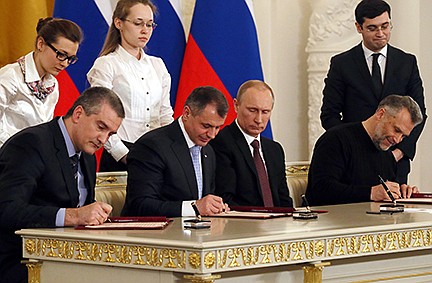MOSCOW - A defiant President Vladimir Putin claimed Crimea as a part of Russia on Tuesday, reversing what he described as a historic mistake made by the Soviet Union 60 years ago and brushing aside international condemnation that could leave Russia isolated for years to come.
Within minutes of delivering a passionate speech to Russia's political elite, Putin cemented his pledge by signing a draft treaty with Crimean leaders to make the strategic Black Sea peninsula part of Russia. The events unfolded two days after Crimeans voted in a disputed referendum to break away from Ukraine. While the treaty signed Tuesday still needs parliamentary approval, that is regarded as a formality.
"Crimea has always been an integral part of Russia in the hearts and minds of people," Putin declared in his address, delivered in the chandeliered St. George's Hall in the Grand Kremlin Palace before hundreds of members of parliament, governors and others. His remarks, which lasted 47 minutes, were interrupted repeatedly by thunderous applause, standing ovations and at the end chants of "Russia, Russia." Some in the audience wiped tears from their eyes.
Reaching deep into Russian and Soviet history, Putin said he did not seek to divide Ukraine any further, but vowed that he would protect Russia's national security from what he described as Western, and particularly American, actions that had left Russia feeling cornered.
He spoke as he has often in the past of the humiliations Russia has suffered in a world with one dominant superpower -- from the NATO air war in Kosovo in 1999 against Moscow's Serbian allies to the one in Libya that toppled Moammar Gadhafi in 2011 on what he called the false pretense of a humanitarian intervention.
Putin dipped into deep wells of emotion, starting with the 10th century baptism of Prince Vladimir, whose conversion to Orthodox Christianity transformed the kingdom then known as Rus, to the collapse of the Soviet Union, which left many Russians of his generation feeling that they had been stripped of their nation overnight.
"Millions of Russians went to bed in one country and woke up abroad," he said. "Overnight, they were minorities in the former Soviet republics, and the Russian people became one of the biggest -- if not the biggest -- divided nation in the world."
Assailing the West for what he has said were its broken promises, he said: "They cheated us again and again, made decisions behind our back, presenting us with completed facts. That's the way it was with the expansion of NATO in the east, with the deployment of military infrastructure at our borders. They always told us the same thing: 'Well, this doesn't involve you.' "
In a deepening clash of wills, Western reaction was swift. The White House condemned the move, which it said it would not recognize. Britain's foreign secretary, William Hague, told Parliament on Tuesday that the crisis in Ukraine "is the most serious test of European security in the 21 century so far."
"No amount of sham and perverse democratic process or skewed historical references can make up for the fact that this is an incursion into a sovereign state and a land grab of part of its territory with no respect for the law of that country or for international law," he said.
German Chancellor Angela Merkel firmly rejected Moscow's absorption of Crimea, a position she said was widely supported by international organizations including the United Nations and the European Council.
"The so-called referendum breached international law, the declaration of independence which the Russian president accepted yesterday was against international law, and the absorption into the Russian Federation is, in our firm opinion, also against international law," Merkel told reporters in Berlin.
U.S. Vice President Joe Biden, in Warsaw, Poland, on Tuesday in a show of support for countries unnerved by the Russian incursion into Ukraine rebutted Putin's assertions.
"Russia has offered a variety of arguments to justify what is nothing more than a land grab," he said. "But the world has rejected those arguments."
While Western sanctions in response to Sunday's referendum on independence in Crimea had been relatively mild, U.S. officials had already made clear they would ratchet up the pressure if Putin went ahead with annexation. The Obama administration is expected to react quickly with a new round of sanctions targeting three groups: Russian government officials, the Russian arms industry and Russians who work on behalf of government officials, the latter called "Russian government cronies" by a senior U.S. official.
Putin brushed aside concerns about economic sanctions and diplomatic isolation, saying the West had forced Russia's hand. By supporting the political uprising that toppled Ukraine's president, Viktor Yanukovych, the United States and Europe crossed "a red line," Putin said, forcing him to act to protect Crimea's population from what he called "Russophobes and neo-Nazis" that had seized control in an illegal coup abetted by foreigners.
"If you press a spring too hard," he said, "it will recoil."
If there had been any doubt before Tuesday, Putin made it clear that within what he considers his sphere of interest he would not be cowed by international pressure. And the speed of his moves in Crimea, redrawing an international border that has been recognized as part of an independent Ukraine since 1991, has been breathtaking.
Just three weeks after Russian special operations troops seized control of strategic locations on the peninsula, the authorities there organized and held a disputed referendum that paved the way for Tuesday's treaty signing. Putin called the outcome of the vote -- almost 97 percent in favor of secession -- "more than convincing."

